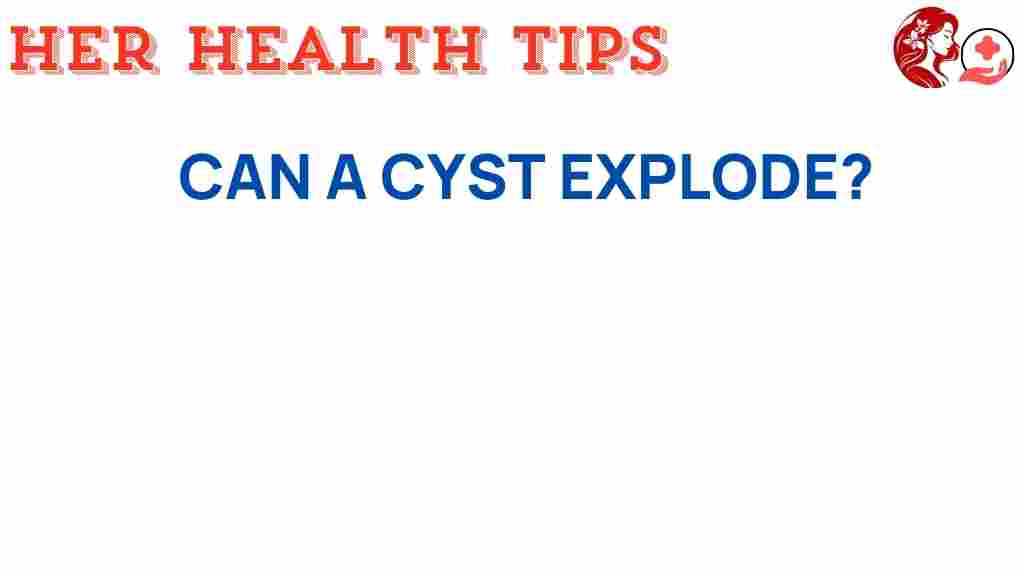The Shocking Truth: Can a Cyst Explode in Your Body?
Cysts are common growths that can develop in various parts of the body. Many people wonder about their potential risks, including the possibility of a cyst rupturing or “exploding.” In this article, we will explore the nature of cysts, their symptoms, diagnosis, treatment options, and the medical myths surrounding them. Our focus will be on understanding the implications of a cyst rupture and how to promote overall wellness and prevention.
Understanding Cysts
A cyst is a closed sac-like structure filled with fluid, semi-solid material, or gas. They can form in any tissue in the body and vary in size from tiny to large masses. While most cysts are benign and do not cause any health issues, some can lead to complications.
Types of Cysts
Cysts can be classified into several types based on their location and characteristics:
- Epidermoid cysts: Typically found on the skin and filled with keratin.
- Pilar cysts: Usually form on the scalp.
- Ovarian cysts: Develop in the ovaries and are common during the reproductive years.
- Breast cysts: Fluid-filled sacs within breast tissue.
- Ganglion cysts: Found near joints and tendons, often in the hands and wrists.
Common Symptoms of Cysts
While many cysts are asymptomatic, some may present with symptoms, especially if they grow large or become infected. Common symptoms include:
- Pain or discomfort in the affected area.
- Swelling or a noticeable lump.
- Redness or inflammation, particularly if the cyst is infected.
- Fluid drainage or leakage, which may occur if a cyst ruptures.
Can a Cyst Rupture?
The notion that a cyst can “explode” in your body is often exaggerated. However, cysts can rupture, which can lead to various health complications depending on their type and location.
What Happens When a Cyst Ruptures?
When a cyst ruptures, its contents can spill into surrounding tissues, potentially causing inflammation, infection, and pain. The severity of symptoms can vary:
- Localized pain: Pain can occur at the site of the rupture.
- Infection risk: If bacteria enter through the ruptured cyst, it can lead to an infection.
- Fluid accumulation: In some cases, fluid may collect in the surrounding area, leading to further swelling.
Diagnosis of Cysts
To determine if a cyst is present and whether it has ruptured, healthcare professionals may use:
- Physical examination: A doctor will assess the size, shape, and tenderness of the cyst.
- Ultrasound: This imaging technique helps visualize the cyst and its contents.
- CT or MRI scans: These may be necessary for deeper evaluation, especially for internal cysts.
Medical Myths About Cysts
There are several misconceptions surrounding cysts that can lead to unnecessary worry. Here are some common medical myths:
- Myth 1: All cysts are cancerous.
Truth: Most cysts are benign and do not pose a cancer risk. - Myth 2: Cysts always require surgery.
Truth: Many cysts do not need treatment unless they cause symptoms. - Myth 3: If a cyst ruptures, it will cause serious health issues.
Truth: While complications can occur, many ruptured cysts can be managed effectively.
Treatment Options for Cysts
The treatment for a cyst depends on various factors, including its type, size, location, and whether it is causing symptoms. Here are common treatment options:
1. Observation
Many cysts do not require treatment. If a cyst is asymptomatic, a healthcare provider may recommend monitoring it over time.
2. Medications
For symptomatic cysts, medications may help alleviate pain and inflammation:
- Over-the-counter pain relievers, such as ibuprofen or acetaminophen.
- Antibiotics if the cyst is infected.
3. Drainage
If a cyst is causing significant discomfort or has ruptured, a healthcare provider may perform a drainage procedure:
- Aspiration: A needle is used to withdraw fluid from the cyst.
- Incision and drainage: A minor surgical procedure to remove the cyst and its contents.
4. Surgical Removal
In some cases, surgical intervention may be necessary, particularly for:
- Large cysts that cause discomfort.
- Cysts that are recurrent or suspected to be cancerous.
Wellness and Prevention
While not all cysts can be prevented, certain lifestyle choices can promote overall wellness and potentially reduce the risk of cyst formation:
- Maintain a healthy diet: Consuming a balanced diet rich in vitamins and minerals supports skin and tissue health.
- Stay hydrated: Adequate water intake helps maintain skin elasticity and reduce cyst formation.
- Practice good hygiene: Regular washing of the skin can help prevent clogged pores that lead to cysts.
- Manage stress: Stress management techniques can improve overall health and potentially reduce the likelihood of cysts.
Troubleshooting Tips for Cyst-Related Concerns
If you notice symptoms that may indicate a cyst or if you suspect a cyst has ruptured, consider the following troubleshooting tips:
- Keep track of symptoms: Document any changes in size, pain level, or appearance of the cyst.
- Consult a healthcare provider: If symptoms worsen or if you experience fever, increased pain, or pus drainage, seek medical attention.
- Follow up on treatment: If you have had a cyst treated or drained, follow your doctor’s recommendations for care and monitoring.
Conclusion
Understanding cysts, their symptoms, and treatment options is crucial for managing your health. While the idea of a cyst exploding in your body can be alarming, most cysts are benign and manageable. By recognizing the signs of complications and seeking timely medical advice, you can effectively navigate any concerns related to cysts.
For more information on cysts and related health concerns, visit this external resource. Remember that maintaining a healthy lifestyle can contribute significantly to your overall wellness and prevention of health issues.
If you have further questions about cysts or need guidance on your health journey, don’t hesitate to reach out to a healthcare professional.
This article is in the category Conditions and created by HerHealthTips Team
